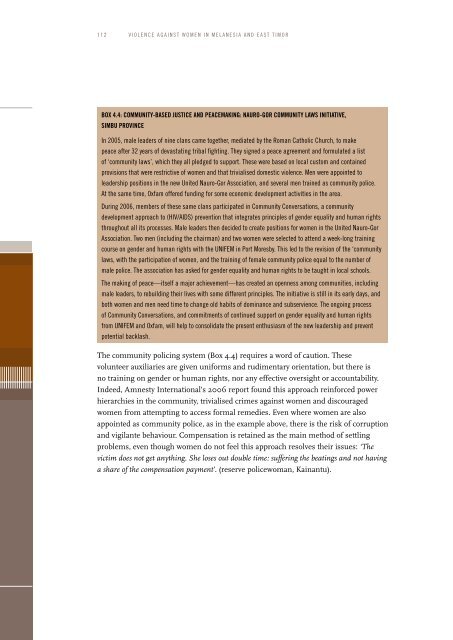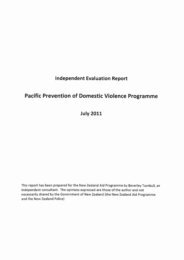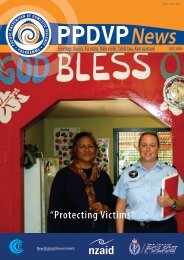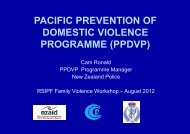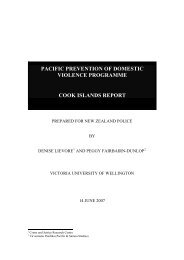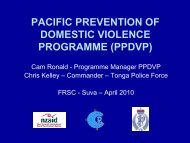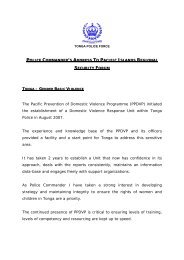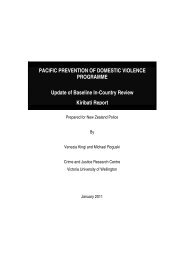Violence against women in Melanesia and East Timor - Office of ...
Violence against women in Melanesia and East Timor - Office of ...
Violence against women in Melanesia and East Timor - Office of ...
Create successful ePaper yourself
Turn your PDF publications into a flip-book with our unique Google optimized e-Paper software.
112 v i o l e n c e a g a i n s t w o m e n i n m e l a n e s i a a n d e a s t t i m o r<br />
Box 4.4: Community-based justice <strong>and</strong> peacemak<strong>in</strong>g: Nauro-Gor Community Laws Initiative,<br />
Simbu Prov<strong>in</strong>ce<br />
In 2005, male leaders <strong>of</strong> n<strong>in</strong>e clans came together, mediated by the Roman Catholic Church, to make<br />
peace after 32 years <strong>of</strong> devastat<strong>in</strong>g tribal fight<strong>in</strong>g. They signed a peace agreement <strong>and</strong> formulated a list<br />
<strong>of</strong> ‘community laws’, which they all pledged to support. These were based on local custom <strong>and</strong> conta<strong>in</strong>ed<br />
provisions that were restrictive <strong>of</strong> <strong>women</strong> <strong>and</strong> that trivialised domestic violence. Men were appo<strong>in</strong>ted to<br />
leadership positions <strong>in</strong> the new United Nauro-Gor Association, <strong>and</strong> several men tra<strong>in</strong>ed as community police.<br />
At the same time, Oxfam <strong>of</strong>fered fund<strong>in</strong>g for some economic development activities <strong>in</strong> the area.<br />
Dur<strong>in</strong>g 2006, members <strong>of</strong> these same clans participated <strong>in</strong> Community Conversations, a community<br />
development approach to (HIV/AIDS) prevention that <strong>in</strong>tegrates pr<strong>in</strong>ciples <strong>of</strong> gender equality <strong>and</strong> human rights<br />
throughout all its processes. Male leaders then decided to create positions for <strong>women</strong> <strong>in</strong> the United Nauro-Gor<br />
Association. Two men (<strong>in</strong>clud<strong>in</strong>g the chairman) <strong>and</strong> two <strong>women</strong> were selected to attend a week-long tra<strong>in</strong><strong>in</strong>g<br />
course on gender <strong>and</strong> human rights with the UNIFEM <strong>in</strong> Port Moresby. This led to the revision <strong>of</strong> the ‘community<br />
laws, with the participation <strong>of</strong> <strong>women</strong>, <strong>and</strong> the tra<strong>in</strong><strong>in</strong>g <strong>of</strong> female community police equal to the number <strong>of</strong><br />
male police. The association has asked for gender equality <strong>and</strong> human rights to be taught <strong>in</strong> local schools.<br />
The mak<strong>in</strong>g <strong>of</strong> peace—itself a major achievement—has created an openness among communities, <strong>in</strong>clud<strong>in</strong>g<br />
male leaders, to rebuild<strong>in</strong>g their lives with some different pr<strong>in</strong>ciples. The <strong>in</strong>itiative is still <strong>in</strong> its early days, <strong>and</strong><br />
both <strong>women</strong> <strong>and</strong> men need time to change old habits <strong>of</strong> dom<strong>in</strong>ance <strong>and</strong> subservience. The ongo<strong>in</strong>g process<br />
<strong>of</strong> Community Conversations, <strong>and</strong> commitments <strong>of</strong> cont<strong>in</strong>ued support on gender equality <strong>and</strong> human rights<br />
from UNIFEM <strong>and</strong> Oxfam, will help to consolidate the present enthusiasm <strong>of</strong> the new leadership <strong>and</strong> prevent<br />
potential backlash.<br />
The community polic<strong>in</strong>g system (Box 4.4) requires a word <strong>of</strong> caution. These<br />
volunteer auxiliaries are given uniforms <strong>and</strong> rudimentary orientation, but there is<br />
no tra<strong>in</strong><strong>in</strong>g on gender or human rights, nor any effective oversight or accountability.<br />
Indeed, Amnesty International’s 2006 report found this approach re<strong>in</strong>forced power<br />
hierarchies <strong>in</strong> the community, trivialised crimes <strong>aga<strong>in</strong>st</strong> <strong>women</strong> <strong>and</strong> discouraged<br />
<strong>women</strong> from attempt<strong>in</strong>g to access formal remedies. Even where <strong>women</strong> are also<br />
appo<strong>in</strong>ted as community police, as <strong>in</strong> the example above, there is the risk <strong>of</strong> corruption<br />
<strong>and</strong> vigilante behaviour. Compensation is reta<strong>in</strong>ed as the ma<strong>in</strong> method <strong>of</strong> settl<strong>in</strong>g<br />
problems, even though <strong>women</strong> do not feel this approach resolves their issues: ‘The<br />
victim does not get anyth<strong>in</strong>g. She loses out double time: suffer<strong>in</strong>g the beat<strong>in</strong>gs <strong>and</strong> not hav<strong>in</strong>g<br />
a share <strong>of</strong> the compensation payment’. (reserve policewoman, Ka<strong>in</strong>antu).


